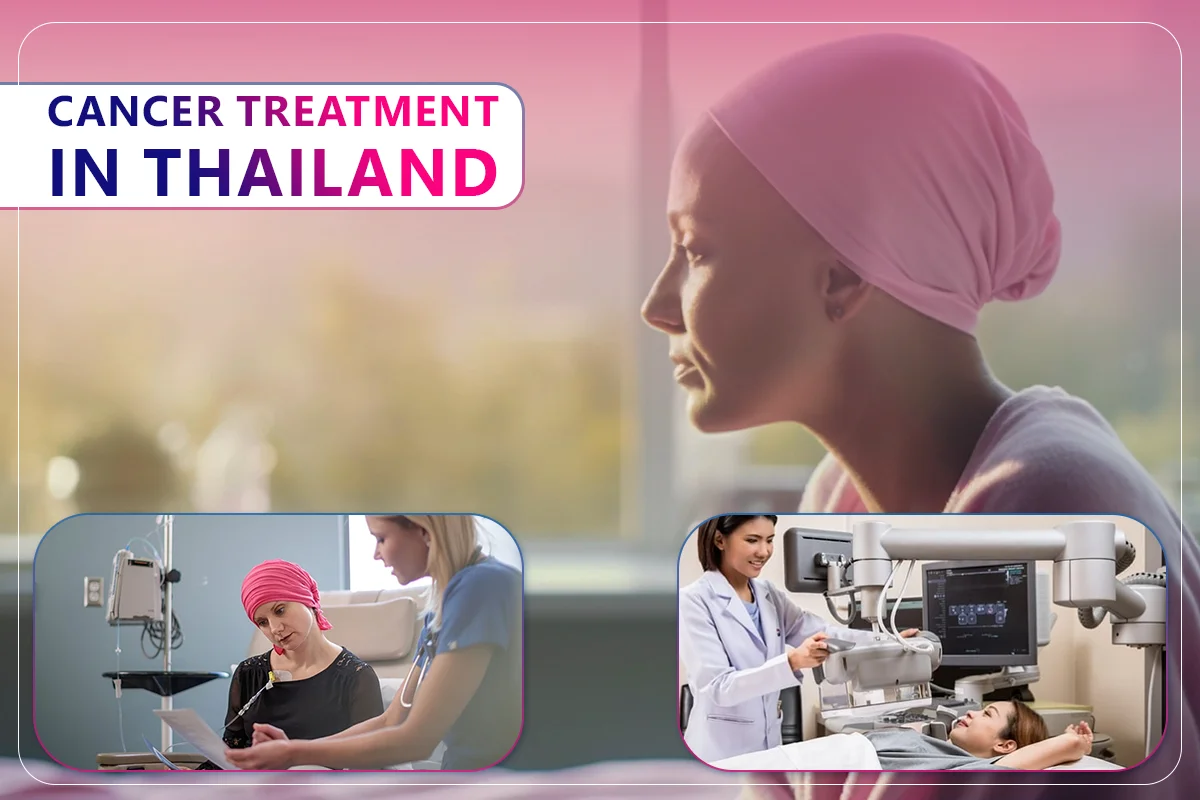Have you ever wondered why more patients are choosing cancer treatment in Thailand? It’s because Thailand has become a leading destination for cancer treatments. Also, it gained trust due to its affordable cost and advanced treatment methods.
A recent study shows that every year, Thailand welcomes over 3 million international medical tourists. A large part of them come for advanced cancer therapies and treatment. Furthermore, Thailand combines modern hospitals with highly trained doctors. That gives patients access to modern care at a reasonable cost. Therefore, patients not only receive safe and effective therapies but also comfort during their medical journey.
In the following guide, you will discover why more people choose Thailand for cancer care. Step by step, we will cover treatment options, the best hospitals, costs, and practical tips for foreigners. Also, learn why Thailand is now one of the top choices for cancer treatment.
Why Choose Thailand for Cancer Treatment?
Thailand has become one of the most reliable destinations for cancer treatment over the years. There are various reasons to choose it.

We’ve explained some reasons below why you should choose it:
- Firstly, Thailand treats millions of international patients every year. It shows the country’s medical excellence in global healthcare. Also, it includes advanced machinery, expert doctors, and patient-focused care.
- Second, Thailand has moved quickly to add high-end cancer tools. For example, major centers now use MR-LINAC machines for ultra-precise radiation. In addition, a national proton therapy center offers highly targeted beams for hard-to-reach tumours. Therefore, patients can access modern technology that reduces damage to healthy tissue. Overall, it improves outcomes.
- Thai hospitals focus on teamwork. Their tumour boards review most cancer cases. The surgeons, oncologists, radiologists, and pathologists make the treatment plan together. Moreover, Thailand is active in cancer research and clinical trials. Thus, eligible patients can access new drugs and protocols through local networks.
- Thailand’s hospitals care for international patients. Large hospitals run dedicated international offices and patient coordinators. Consequently, booking, language help, visa letters, and follow-up are easier. Also, private and public hospitals offer clear paths for second opinions and combined treatment plans.
Finally, cost is often lower in terms of quality. In short, Thailand combines modern tech, a wide range of care, and research opportunities. Therefore, patients choose it as a smart and practical choice for cancer care.
Types of Cancer Treatment Available in Thailand
Thailand offers various cancer treatments combining traditional and advanced technologies. Doctors choose treatment types depending on the type of cancer. Each treatment type is different and has its limits.
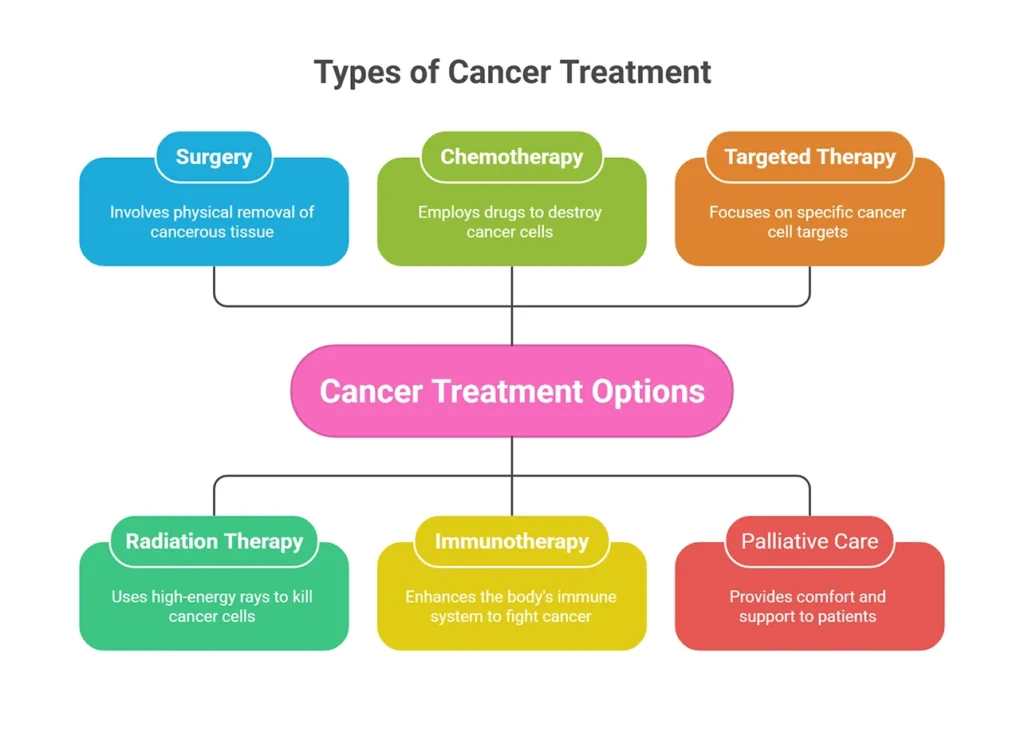
Main types of cancer treatments are:
- Surgery
- radiation Therapy
- Chemotherapy
- Immunotherapy
- Targeted Therapy
- Supportive and Palliative Care
We’ve explained each treatment below:
Surgery
Many hospitals prefer tumour removal surgery. For that, they use robotic tools or a minimally invasive technique. It means a smaller cut, minimal pain, and quick recovery.
Surgery is often the first choice for many doctors if patients come in at an early stage. For example, breast or colon cancer needs surgery first. Therefore, sometimes doctors combine surgery with chemo or radiation afterward. It’s called adjuvant therapy and is used to improve results.
Radiation Therapy
Radiation produces high-energy cells and helps to kill cancer cells. For cancer treatment in Thailand, many hospitals use advanced forms like IMRT, VMAT, and IGRT. These forms help to target tumours precisely. Moreover, it spares healthy tissue.
Furthermore, there are newer machines that adjust with the patient’s motion to check if breathing moves the tumour. Some hospitals in Thailand use stereotactic radiosurgery, or SBRT, for hard-to-remove tumours.
Chemotherapy
Chemotherapy uses medicines to stop cancer cells. Depending on the type, doctors give chemotherapy through IV or by mouth. Thailand’s cancer hospitals adjust the chemo treatment plans for each patient.
At first, they check the patient’s cancer stage, type, and health. Therefore, the treatment becomes personalized. Doctors also monitor the side effects. Hospitals provide supportive therapy to reduce side effects. For example, nausea, hair loss, etc.
Immunotherapy
Immunotherapy uses a patient’s own immune system to fight cancer. It includes checkpoint inhibitors, monoclonal antibodies, and CAR-T cell therapy in specific cases.
This treatment is now growing in Thailand. Major cancer centers are using this treatment along with chemo or radiation. It works for cancers that don’t respond well to standard treatments.
Targeted Therapy
When doctors target specific parts of cancer cells, they use targeted therapy. They aim at proteins or genetic markers on those cells.
For example, cancers with HER2, EGFR, or mutations respond well to targeted therapy. This therapy usually has fewer side effects. It also spares healthy cells.
Supportive and Palliative Care
Hospitals offer supportive and palliative care for patients after treatment. It helps to reduce pain, manage symptoms, and improve comfort. Including nutrition support, controlling pain, side-effect medicine, counseling, and rehabilitation.
Best Hospitals for Cancer Treatment in Thailand
Many hospitals in Thailand provide cancer treatment. But some of them stand out in terms of their facilities and care. The top hospitals for cancer treatment in Thailand are:
- Bangkok Hospital, Wattanosoth
- Bumrungrad International Hospital
- Vejthani hospital
- Samitivej Sukhumvit Hospital
- Siriraj Hospital
We’ve explained every hospital’s speciality in cancer and treatment areas below:
Bangkok Hospital
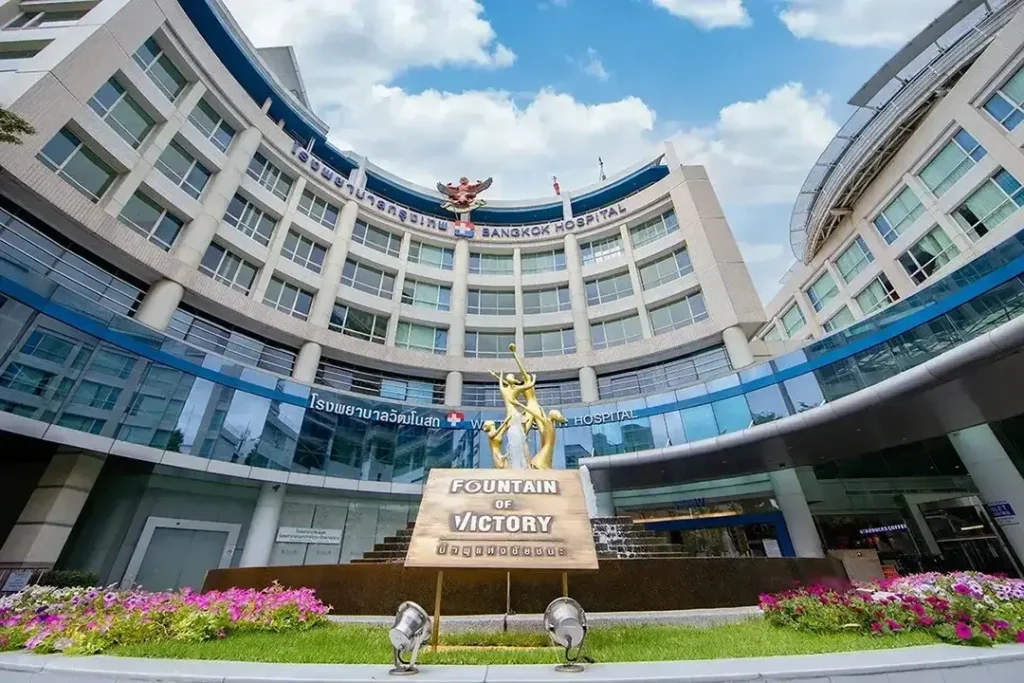
- Bangkok Hospital is a privately operated hospital that specializes in cancer care. It operates as a separate building within Bangkok Hospital, dedicated solely to cancer care.
- It offers all stages of cancer treatment: diagnosis, prevention, treatment, and recovery.
- They use advanced tools. For example, the use of PET/CT imaging, EDGE and IGRT radiation machines, surgical oncology experts, and bone marrow transplants.
- There is a team of oncologists, radiologists, surgeons, pathologists, and nurses at the hospital. They all work together.
- It also offers supportive and palliative care.
Cancer Speciality Area:
- Haematologic cancers. For example, leukaemia, lymphoma, and multiple myeloma; also, stem cell therapy.
- Breast cancer
- Lung / thoracic cancer.
- Gastrointestinal cancers
- Head & neck cancers.
- Urological cancers.
Bumrungrad International Hospital
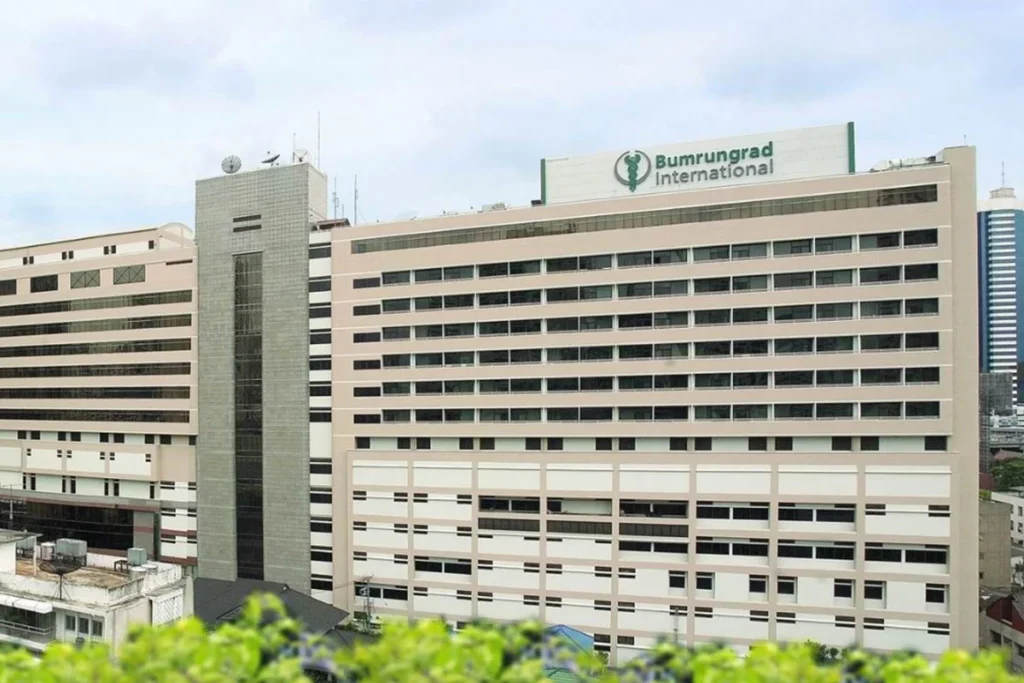
- This hospital provides total cancer care, including screening, early detection, advanced therapy, and follow-ups.
- Immunotherapy, targeted therapy, VMAT radiation, brachytherapy, and bone marrow/stem cell transplantation are examples of modern therapy.
- One of Asia’s leading oncology hospitals.
Cancer Speciality Area:
- Breast cancer.
- Lung cancer.
- Prostate cancer.
- Colorectal cancer.
- Liver cancer.
- Pancreatic cancer.
- Blood cancers.
Vejthani Hospital – Life Cancer Center
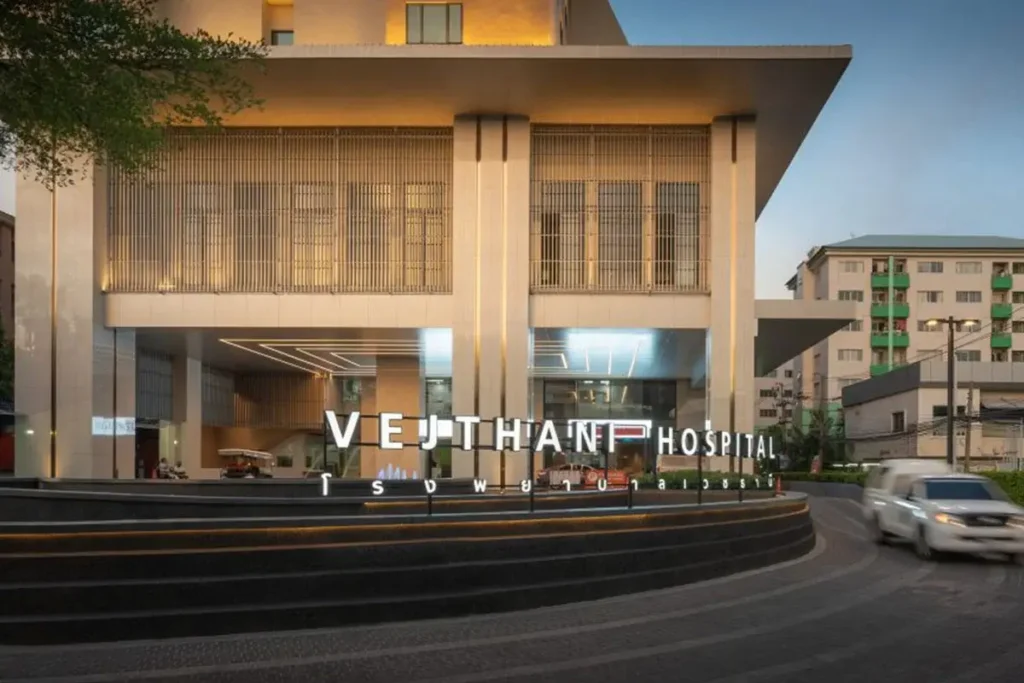
- An internationally known hospital with an authorization and safety record.
- It also combines modern technology and personalized care from highly qualified medical professionals.
- Pay attention to the early diagnosis and less invasive treatments where possible. Moreover, it has proper supportive care facilities.
Cancer Speciality Area:
- Cervical cancer.
- Colorectal cancer.
- Breast cancer
- Lung cancer
- Leukaemia.
Samitivej Sukhumvit Hospital
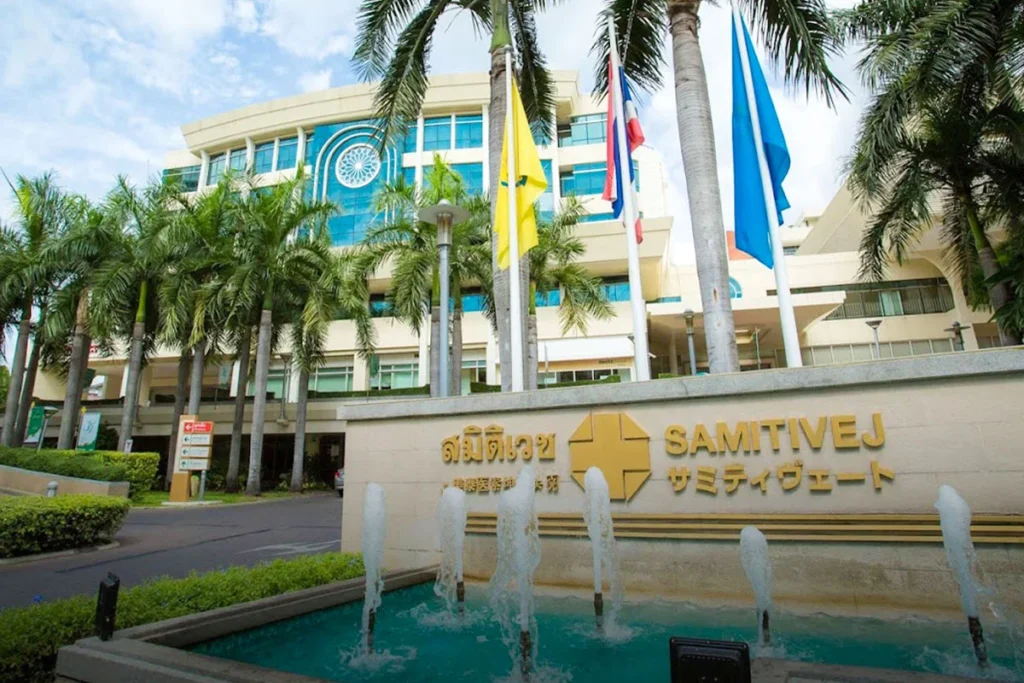
- This hospital offers a modern oncology clinic seven days a week.
- Moreover, it offers bone marrow transplants, immunotherapy, radiotherapy, chemotherapy, and surgery.
- Provides excellent screening programs and breast reconstruction to cancer survivors.
Cancer Speciality Area:
- Breast cancer.
- Thyroid cancer (I-131 ablation).
- Hematologic cancers.
- Reconstructive surgery for cancer patients.
Siriraj Hospital
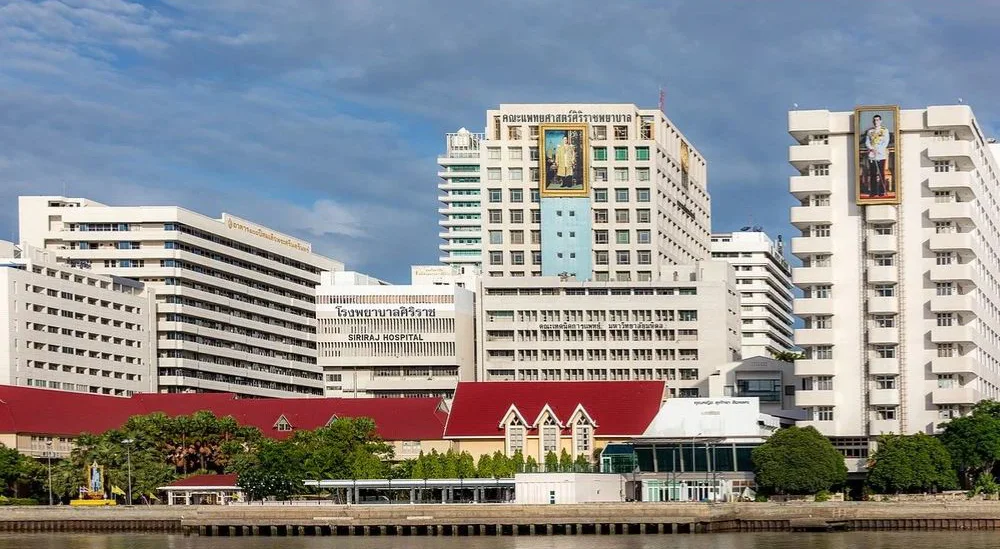
- One of the top teaching hospitals in Thailand. They have excellent research, treatments, and decades of experience.
- Provides dedicated centers for most types of cancer.
- Applies MR-LINAC technology to deliver radiation that is very precise with minimal side effects.
Cancer Speciality Area:
- Blood cancers: leukemia, lymphoma, multiple myeloma.
- Solid tumours: lung, breast, head & neck, gastrointestinal cancers.
- Handles complex and advanced cases referred from across Thailand.
Cancer Treatment Cost in Thailand: A Complete Guide
Patients from all over the world come to Thailand for cancer treatment. But before making the decision, they should know the complete cost guide. Including treatment expenses and cost management tips.
Treatment cost often differs from time to time and changes depending on some factors. We’ve explained a full guide on what cancer treatment in Thailand costs and how to plan wisely.
Cancer Treatment Surgery and Therapy Cost in Thailand
1. Major Cancer Surgery
The cost depends on how complex the surgery is. You can expect the cost to be between USD 3000 and USD 25000. Also, it varies depending on special support and reconstructive surgery after treatment.
2. Chemotherapy (Cost per cycle)
The chemotherapy cost depends on the type of medicine, cancer stage, and patient health. It starts from USD 600 up to USD 6800 or more.
3. Radiation Therapy
A full radiation therapy treatment using precise methods may cost USD 5,000 to USD 12,000. Simpler or older radiation systems cost less.
4. Proton Therapy
It’s a specialized treatment and often costs more. A full treatment can cost USD 30000 to USD 45000. It depends on the hospital, the affected body parts, and the number of sessions.
5. Immunotherapy and Targeted Therapy
These treatments often cost USD 4,000 to USD 50,000 or more. It depends on the medicine, cycles, and the number of biomarkers or genetic tests needed.
6. Stem Cell / Bone Marrow Transplant
The treatment depends on some factors. For example, the type of transplant, hospital stay, complication, etc. The costs can start from USD 20000 to USD 80000 or more.
Cost Management Tips: How to Get an Affordable Price
To manage cancer treatment costs in Thailand, a proper calculation is important. Here are some tips on how to manage costs.
- Send your medical records, scans, and pathology reports to the hospital.
- Ask for a fully itemized quote: drugs, surgery, room, diagnostics, and follow-ups.
- Compare quotes from 2-3 hospitals.
- Ask if there are package deals available.
- Consider public or university hospitals for standard treatments. Those are often lower in cost.
- Get a clear view of travel, meals, and translation costs.
- Use hospitals with international patient services. They help to clarify the costs.
- Check insurance eligibility and whether your insurer will cover the costs abroad.
- Prepare for any unexpected costs and add some extra to your budget.
- Plan early. Sometimes, it helps lock in better prices.
Cancer Treatment for Foreigners: Visa, Travel, and Logistics
Thailand welcomes thousands of medical travelers every year. The country has made cancer treatment for foreigners simple and easy. From visa support to airport transfers, most hospitals have international departments to guide patients at every step.
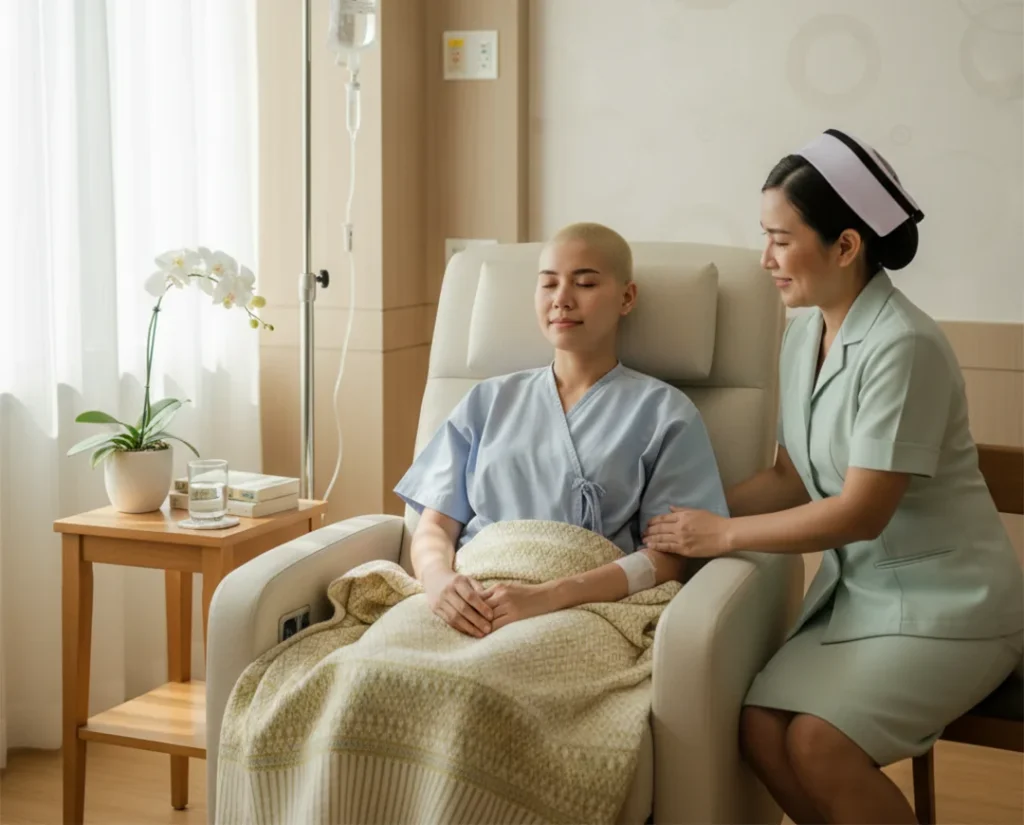
Visa arrangement
Many foreign patients enter on a medical visa or extend their tourist visa for treatment. Leading hospitals issue supporting documents that help speed up the process. Patient advisors also guide families through immigration rules and extensions if longer treatment is needed.
Travel convenience
Bangkok and other major cities are well-connected with direct flights from Asia, the Middle East, Europe, and beyond. Hospitals often provide airport pickup and transfer services. That makes arrival easier for patients who may not feel well after long flights.
Flexible accommodation
Hotels and serviced apartments near hospitals offer medical stay packages. Many hospitals even partner with nearby hotels and offer discounts on long-stay rates.
International patient centers
They manage all logistics, including medical records, translation, and interpreter services. Also, they provide local SIM cards. Moreover, they help patients and their families with transport, pharmacy delivery, and follow-up scheduling.
How to Choose the Best Hospital for Cancer Treatment in Thailand?
Choosing the right hospital for your cancer treatment is crucial. As a patient, you might want excellent care, trust, and comfort. Below, we’ve explained some key criteria to choose wisely. Use them, especially if you are a foreign patient in Thailand for cancer treatment.
Key Criteria to Consider:
Certifications and Hospital Reputation
- Check if the hospital has international accreditations like JCI.
- Also, see if it follows local hospital quality standards.
- Read what past patients say. A strong reputation shows the hospital meets high benchmarks across treatments.
Cancer Specialists Doctor Team
- Check the doctor’s specialities according to your cancer type.
- Also, review their experience in surgery, immunotherapy, or advanced radiation.
- Read the doctor’s published research and check their involvement in clinical trials.
Treatment Options and Advanced Technology
- Review the hospital’s treatment options.
- Choose hospitals that offer several cancer treatment options
- Furthermore, look for advanced tech like genetic profiling or proton therapy. It gives more precision.
Transparency and Cost Clarity
- The best hospitals provide clear cost breakdowns.
- Learn what’s included and what’s added.
- Check for payment options or financial counselling.
- As a foreign patient, be transparent about costs to avoid surprises.
International Support Services
- Check for strong support services for foreign patients.
- It includes translators, visa help, international coordination, and a guide.
Specialised Cancer Clinics
- Match your cancer type to hospitals with clinics.
- For example, if you have breast cancer, find centers known for breast surgical teams.
Clinical Trials & Research on Cancer Treatment in Thailand

Thailand is not only popular in regular cancer care but also active in clinical research. Most major hospitals participate in international research and clinical trials. These studies give patients access to advanced medications and targeted therapies. Moreover, it introduces unique methods that are not yet widely available.
To patients, the trial can be a last hope when the conventional alternatives fail. It also enables doctors to test improved treatment in the future.
But one should consider both advantages and disadvantages. On the bright side, you can get innovative treatment, close attention, and professional treatment. However, not everything works out, and side effects can be unpredictable.
Patients may directly ask their cancer specialist to find a clinical trial. Also, they can check hospital research centers. International patient coordinators often guide foreigners to see if they qualify.
Patient Journey: Safety and Comfort in Cancer Care
Cancer treatment doesn’t end with medicine. It also includes living well during and after therapy. Hospitals in Thailand are highly concerned with patient comfort and safety.
Hospital schedules follow-up as needed. Doctors monitor progress, scan, and modify treatment where necessary. Nurses and coordinators also assist patients with the side effects of chemotherapy or radiation. Overall, it helps with easy recovery.
Dieticians design meal plans. Psychologists show patients the direction through stress. Physical therapists help restore strength. All these services enhance the living standards.
Palliative services offer compassionate care to patients in their last stages. It includes pain management, emotional support, and family counselling. Moreover, the service in Thailand is not just about survival, but it is also about the well-being of patients.
Practical Tips Before Going to Thailand for Cancer Treatment
Before starting cancer treatment in Thailand, a little planning helps a lot.
- Carry medical records, scan results, and a list of current medicines. Having everything ready saves time during consultations.
- Confirm if your health insurance covers overseas cancer treatment for foreigners. If not, ask about hospital payment plans.
- Treatment costs vary. Always request a full estimate in advance, including doctor fees, tests, and hospital stay.
- It is normal to ask another cancer specialist for advice. This ensures you feel confident with your plan.
- Bring comfortable clothes, personal medicines, and a companion for support. Some patients also bring food items they prefer.
- When patients and their families prepare well, they feel less stress. This helps them focus on treatment and healing.
Conclusion
Finally, cancer treatment in Thailand gained trust over the years. It has the best hospitals for cancer treatment. Moreover, it provides cutting-edge technology, expert professional teams, and support for foreign patients. Also, ensures that both local and international patients receive top-quality care.
Patients can receive treatment like immunotherapy, radiotherapy, stem cell therapy, chemotherapy, and surgery. Palliative and supportive care focus on treating cancer while also helping patients live better.
Furthermore, hospitals make it easy for foreigners to travel, get visas, and arrange logistics. The cost transparency, second opinions, and useful advice make patients plan with confidence. Choosing the correct hospital and preparing makes patients focus on the recovery process.
Altogether, cancer treatment in Thailand is a combination of high-quality care and advanced treatment. This makes it a reliable choice for patients worldwide.
